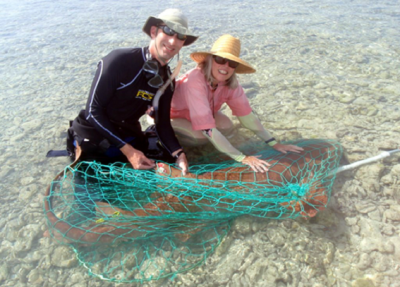Harold “Wes” Pratt, Theo Pratt, Dr. Nick Whitney and Dr. Jeff Carrier

Little is known of shark reproductive behavior. Most sharks are particularly elusive when mating but nurse sharks, Ginglymostoma cirratum, are a happy exception. We started our work with the nurse sharks of the Dry Tortugas, the most remote island group in the Florida Keys, to understand and explore the fascinating world of nurse shark behavior and population ecology. Through the pioneering work of Jeff Carrier in the 1980’s, we found a “glassless aquarium,” a rare finite window to the world of shark reproduction. Our long term study (since 1991) of the island group’s resident population is unique – a continuous view of a free living shark population encompassing all stages of their reproductive life history from birth through adult mating. In the warm clear waters of the Tortugas we use tagging, telemetry, accelerometry, videography and old-fashioned observation to study shark mating behavior, genetics, habitat use and population ecology.
A peculiar characteristic of female behavior that we have defined as “refuging” permits our seasonal shallow water observation and our interaction with this otherwise obscure sharky ritual. Eight foot females rest in water as shallow as one foot deep to escape and control the advances of the reproductively peaked males. Copulation results from only 7% of the male’s aggressive encounters which we term courtship events.
In our 18 year study of nurse shark reproductive behavior, we have seen mating females avoid specific males and seemingly choose others that are more fit. Adult male behavior is likewise complex. We have filmed reproductively active male nurse sharks as they sacrifice their chance at mating to cooperate with another male and help him copulate. Put in context with other shark species, we have learned that there is more than meets the eye to shark reproduction. Our hope is that as technologies improve, and become more available and affordable, that we can eventually extend these techniques and results to other shark species.
Jeff and Wes began the work in 1991 while Pratt was still with the NMFS Narragansett Apex Predator Program. Since 2002, Pratt, with his wife and colleague Theo have been affiliated with Mote’s Tropical Research Lab in the Florida Keys and currently follow the nurse sharks from their sailing research vessel, the S/V Eos, a Morgan Out-Islander 41 ft. ketch using kayaks and shark borne electronic instrumentation usually applied by Nick Whitney, now also of Mote Marine Laboratory who fills out the regular field team. We are also collegially accompanied at times by Jeff Carrier of Albion College, Ed Heist of So. Illinois University, Mote Marine Lab Interns, Albion College students and National Park Service volunteers.
You may visit: http://isurus.mote.org/Keys/shark_mating.phtml
Pdfs of our work are available by emailing Wes Pratt at wpratt@mote.org